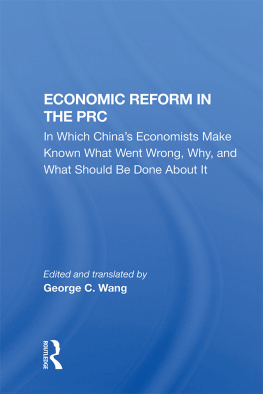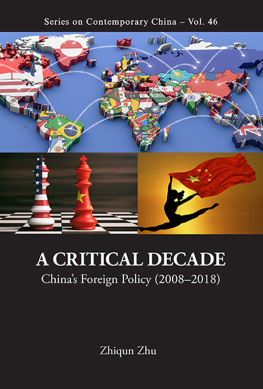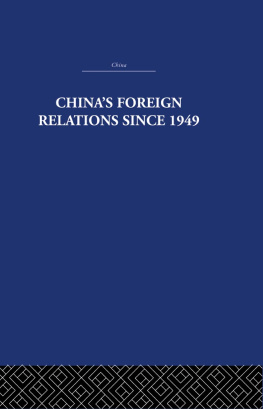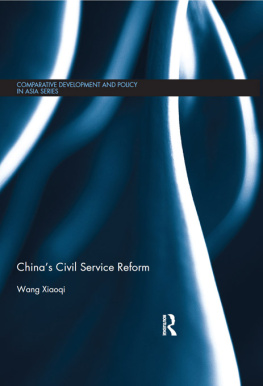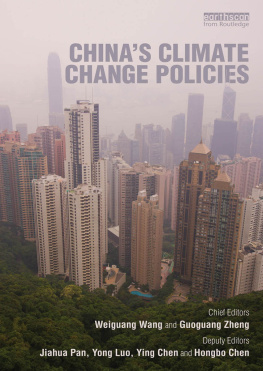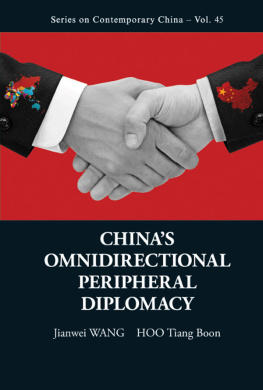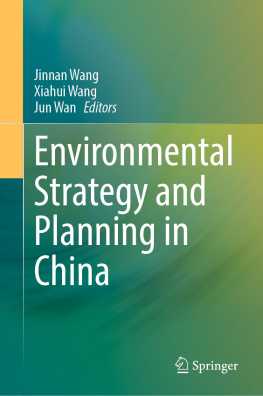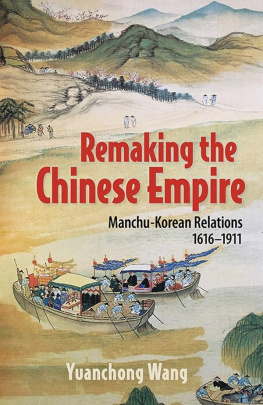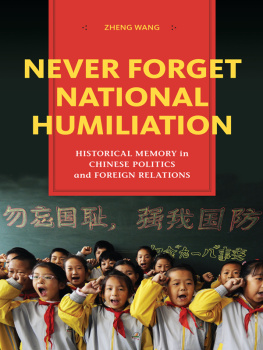Chinas Environmental Foreign Relations
Over recent decades, China has moved from being a follower towards taking on a leadership role in global environmental governance. This book discusses this important development. It examines the key role of Chinese interest groups, showing that, through various domestic dynamics, they have influenced how China has approached issues such as climate change and the environment. Focusing on examples of multilateral environmental treaties, bilateral cooperation and the proposition of alternative normsthe idea of China as an ecological civilisationthe book provides crucial insights on the evolution of Chinas approach to international relations and engagement with global environmental governance and contributes to the discussion of what kind of power China is poised to become.
Heidi Wang-Kaeding is Lecturer in International Relations in the School of Social, Political and Global Studies at Keele University.
China Policy Series
Series Editor: Zheng Yongnian
Advanced Institute of Global and Contemporary China Studies, Chinese University of Hong Kong (Shenzhen)
56. The Politics of Expertise in China
Xufeng Zhu
57. Gender Dynamics, Feminist Activism and Social Transformation in China
Edited by Guogang Wu, Yuan Feng, Helen Lansdowne
58. The Struggle for Democracy in China, Taiwan and Hong Kong
Sharp Power and its Discontents
Andreas Fulda
59. The Chinese Communist Party in Action
Consolidating Party Rule
Edited by Zheng Yongnian and Lance L.P Gore
60. Development and Poverty Reduction
A Global Comparative Perspective
Edited by Zheng Yongnian and Jiwei Qian
61. Designing Emergency Management
Chinas Post-SARS Experience, 20032012
Wee-Kiat Lim
62. Chinas Environmental Foreign Relations
Heidi Wang-Kaeding
63. The Decline of the Western-Centric World and the Emerging New Global Order
Contending Views
Edited by Yun-han Chu and Yongnian Zheng
For more information about this series, please visit: www.routledge.com/China-Policy-Series/book-series/SECPS
First published 2021
by Routledge
2 Park Square, Milton Park, Abingdon, Oxon OX14 4RN
and by Routledge
52 Vanderbilt Avenue, New York, NY 10017
Routledge is an imprint of the Taylor & Francis Group, an informa business
2021 Heidi Wang-Kaeding
The right of Heidi Wang-Kaeding to be identified as author of this work has been asserted by her in accordance with sections 77 and 78 of the Copyright, Designs and Patents Act 1988.
All rights reserved. No part of this book may be reprinted or reproduced or utilised in any form or by any electronic, mechanical, or other means, now known or hereafter invented, including photocopying and recording, or in any information storage or retrieval system, without permission in writing from the publishers.
Trademark notice: Product or corporate names may be trademarks or registered trademarks, and are used only for identification and explanation without intent to infringe.
British Library Cataloguing-in-Publication Data
A catalogue record for this book is available from the British Library
Library of Congress Cataloging-in-Publication Data
A catalog record for this book has been requested
ISBN: 978-0-367-71232-7 (hbk)
ISBN: 978-1-003-14992-7 (ebk)
Typeset in Times New Roman
by Apex CoVantage, LLC
Contents
2 From ecological modernisation to environmental nationalism
Ecological modernisation
Eco-socialism
Chinese environmentalism?
Environmental nationalism
3 A tale of two treaties
Montreal Protocol and Convention on Biological Diversity
Unravelling implementation patterns
Enforcement: procedural versus substantive
Compliance: procedural versus substantive
Partnering enforcement with compliance
Analysis: unexpected interest groups and familiar rhetoric
4 Selective sharing in bilateral environmental cooperation
Bilateral environmental cooperation
Chinese experience
Public interest groups: important in an invisible way
Entering Laos
Seeking new partnership
Analysis: public interest groups in the story of Chinese overseas investment
5 The rise of ecological civilisation
Conceptualising ecological civilisation
Debating ecological civilisation
Registering domestic interests in the international discourse
Analysis: reshuffling power and rebranding image
6 Conclusion: a constructivist utilitarian power?
- 2 From ecological modernisation to environmental nationalism
- Ecological modernisation
- Eco-socialism
- Chinese environmentalism?
- Environmental nationalism
- 3 A tale of two treaties
- Montreal Protocol and Convention on Biological Diversity
- Unravelling implementation patterns
- Enforcement: procedural versus substantive
- Compliance: procedural versus substantive
- Partnering enforcement with compliance
- Analysis: unexpected interest groups and familiar rhetoric
- 4 Selective sharing in bilateral environmental cooperation
- Bilateral environmental cooperation
- Chinese experience
- Public interest groups: important in an invisible way
- Entering Laos
- Seeking new partnership
- Analysis: public interest groups in the story of Chinese overseas investment
- 5 The rise of ecological civilisation
- Conceptualising ecological civilisation
- Debating ecological civilisation
- Registering domestic interests in the international discourse
- Analysis: reshuffling power and rebranding image
- 6 Conclusion: a constructivist utilitarian power?
Guide
Figures
3.1 Implementing agencies of the Montreal Protocol and CBD
3.2 Substantive versus procedural enforcers, CBD
5.1 Ecological civilisation research projects funded by NPOPSS
5.2 Yearly breakdown of funded ecological civilisation projects (by discipline)
5.3 Chinas environmental policy system
5.4 Eco-civilisation system (before 2018)
5.5 Environmental bureaucracy after 2018 cabinet reshuffle
Tables
3.1 Matrix of implementation
3.2 Enforcing agents in the Montreal Protocol
3.3 Matching enforcement and compliance groups
Two topics are gradually and fundamentally changing the future outlook on international relations: the rise of China and the emergence of global environmental governance. The debate on Chinas rise centres on the question of whether the Chinese Communist Party is set to re-write the rules that govern the international community and potentially undermine the liberal international order. Meanwhile, scholars have devoted an increasing volume of work to exploring effective paradigms to address ecological challenges through international cooperation. The convergence of these two topics entered the popular domain when President Donald Trump announced the withdrawal of the United States from the Paris Agreement, which was a landmark achievement of the United Nations Frame Convention on Climate Change (UNFCCC). Western media outlets started looking for a suitable candidate to fill the so-called power vacuum left by this departure in the sphere of international environmental cooperation and subsequently found hope in China. At the 2018 World Economic Forum in Davos, Chinese leader Xi Jinping not only reassured the global audience that he recognised the severe challenge of climate change but also impressed the world with green policies and considerable investment in clean energy.



